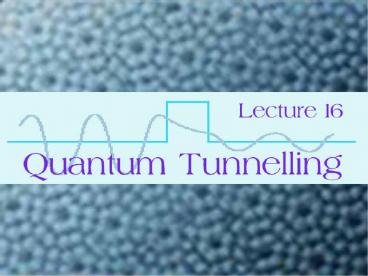Quantum Tunnelling - PowerPoint PPT Presentation
1 / 28
Title:
Quantum Tunnelling
Description:
Normally, the car can only get as far as C, before it falls back again ... Quotes to ponder ... J. Horgan, Quantum Philosophy. Scientific American (July 1997) ... – PowerPoint PPT presentation
Number of Views:2237
Avg rating:3.0/5.0
Title: Quantum Tunnelling
1
Lecture 16
- Quantum Tunnelling
2
Heisenbergs Uncertainty Principle involving
energy and time
- If our measurement lasts a certain time Dt, then
we cannot know the energy better than an
uncertainty DE
3
Imagine the Roller Coaster ...
- Normally, the car can only get as far as C,
before it falls back again - But a fluctuation in energy could get it over the
barrier to E!
4
Quantum Tunnelling
- A particle borrows an energy DE to get over a
barrier - Does not violate the uncertainty principle,
provided this energy is repaid within a certain
time Dt - The taller the barrier, the less likely
tunnelling would occur
5
Quantum Tunnelling Animation
6
Example of Quantum Tunnelling Radioactivity
7
Concept of Half-Life
- 13N has a half-life of 10 min
- Consider a sample of 13N
- After 10 min, half of the 13N atoms would have
decayed and half would not have decayed - After another 10 min, half of the remaining 13N
atoms would have decayed and half would not - Probabilistic process can never predict exactly
when a given atom would decay
8
Applications of Quantum Tunnelling
- Scanning tunnelling microscope
- Tunnel diode
- Josephson junction
9
Scanning Tunnelling Microscope
10
Iron Atoms on Copper
11
35 Xenon Atoms on Nickel
12
If Plancks constant were much larger...
13
A can toppling over due to quantum fluctuations
of its position
Have to wait about 101033 years!!
14
Quantum Teleportation
- Probability that in your lifetime, you would find
yourself teleported onto the surface of Mars,
reassembled, and at least momentarily alive
1 part in 101051
- But quantum teleportation has been achieved
forphotons
Beam me up
15
Discourse on Quantum Weirdness
- Einsteins moon
- Schrödingers cat
- EPR paradox
16
Einsteins Moon
- Does the moon exist if nobody is looking at it?
- Copenhagen interpretation NO! The moon exists
only in terms of probability wave functions - Only when observed do these wave functions
collapse to definite states - Conflict between objective and subjective
realities
17
Schrödingers Cat
- One atom of 13N and a detector
- If atom decays, detector activates a hammer
which breaks a glass containing poison gas - Everything inside a box, together with a cat,
and seal it
18
After 10 minutes has passed, just before we open
the box...
- Copenhagen interpretation The cat exists in a
probabilistic state of being 50 alive and 50
dead - Our act of observation collapses the wave
function and determines its fate instantly
19
Other Interpretations to the Rescue?
- Bohm Quantum potential
- Wigner, Penrose Human consciousness
- von Neumann, Wheeler Participatory universe
- Everett, Deutsch Many-worlds interpretation
20
Recall Double-slit experiment with electron gun
and detector
Can we try to trick the electron, by closing
one slit after it has passed through the wall?
21
Delayed Choice Experiment
Expt carried out now will determine whether each
photon, billions of years ago, behaved like a
particle or wave
22
Many-Worlds Interpretation
- Each quantum process will split the universe into
two or more universes - All the possible universes exist, but none can
communicate with another
Many-worlds FAQ
23
Einstein-Podolsky-Rosen (EPR) Paradox
- Decay of pion
- Electron and positron have opposite spins
24
EPR Paradox (contd)
- Let the electron and positron fly very far apart
- Measure the spin of one of them, say the electron
- This would instantaneously determine the spin of
the positron - Experimentally verified by Aspect (1982)
25
Non-Locality of Quantum Mechanics
Events in Region B instantaneously dependent
upon events in Region A
Events in Region A instantaneously dependent
upon events in Region B
widely separated regions
Einstein Spooky action at a distance
26
Does this contradict special relativity?
- In other words, can this be used to transmit
messages faster than light? - NO! Because outcome is completely probabilistic
- We would never know in advance whether the
electron is going to be spin up or down
27
Quotes to ponder
- Niels Bohr Anyone who is not shocked by
quantum theory has not understood it. - Richard Feynman I think I can safely say
that nobody understands quantum mechanics.
28
Further Reading
- J. Horgan, Quantum PhilosophyScientific American
(July 1997) - R.E. Crandall, The Challenge of Large Numbers
Scientific American (Feburary 1997)

